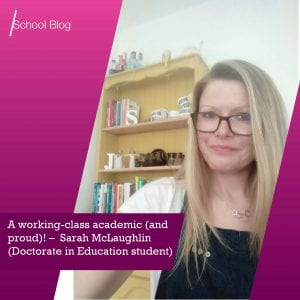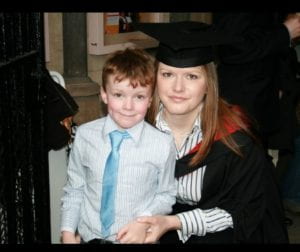 By Sarah McLaughlin, BA(Hons), MSC. PGCE, School of Education, University of Bristol (Doctorate in Education student)
By Sarah McLaughlin, BA(Hons), MSC. PGCE, School of Education, University of Bristol (Doctorate in Education student)
“I have found the School of Education very welcoming and my supervisors extremely encouraging and supportive…my experience during EdD taught modules is that students and staff have made me feel valued, included and accepted.“
I have many roles – I am a mum of two boys, a sociology lecturer for an Access to Higher Education course and an A-level class. I am also a Doctorate in Education academic. I use the term academic because that is what I am and I am really proud of this, however I have never felt that I am a ‘real’ academic because I definitely suffer from imposter syndrome. Imposter syndrome is a psychological pattern whereby individuals feel they aren’t as intelligent or competent as others might think. For me, I think this impression comes from the fact that, due to my social class background, I have never felt that I have been a ‘real’ student.
Different from the average student
I commenced higher education as a mature student (I took a BA (Hons) Business Studies with Human Resource Management) and also as a working mother, so I felt that I was different to the average student (younger and attending university for their degree but also the social aspect). I waited two years in order to be able to afford my progression to my Master’s degree in sociology which I studied part time in order to juggle work and family life – my second son was due on the day of my Master’s dissertation deadline, then after my maternity leave I returned to university to complete my PGCE (Postgraduate Certificate of Education).

Following a number of years of teaching I then commenced my EdD (Education Doctorate). I don’t live in Bristol, so I am geographically isolated, and in order to fund my studies and my family, I work four days a week. I haven’t been able to join any of the societies, meet ups, conferences and extra lectures for these reasons. I feel that my lack of engagement in the extracurricular activities has been a consequence of my socio-economic background. I must work almost full-time to fund my full-time doctorate. This can be frustrating as it also leaves me outside the social aspect of university life. For these reason I identify as a working-class academic and I have felt, as Bently (2020) describes; ‘an outsider looking in’.
Precarity and Diversity in Academia
In her book, Higher Education and Working-Class Academics – Precarity and Diversity in Academia, Teresa Crew writes about having a working-class academic identity and how working-class academics struggle to fit in and can feel a sense of being an outsider. Crew (2020) puts forward four main features that defined respondents in her study as being a working-class academic. These relate to family background, uneven access to capital, a lack of a safety net to ‘manage’ academic precarity, and a habitus war.
During my Master’s degree at Bristol University I was particular aware that my family background (I grew up on a council estate, my dad was a lorry driver and my mum a childminder at the time, however she later graduated as a social worker when I was a teenager, following an Access to Higher Education course) was not typical of a university student; I remember a particular gender studies module where the rest of the class were well spoken, had progressed straight from school to university, and a number of them told me they aspired to be an academic. I remember thinking ‘what is an academic…sounds posh!’. When I completed my A levels tuition fees had been introduced and my parents and I did not understand the system so felt it was too much of a gamble to study sociology (which is the degree I would have taken at that point). I went straight into full time work.
Embarking on my Doctorate
I have no capital to fall back on, I am a single parent (during my first degree I had to sneak my son, then aged 5, into lectures when he was home from half term as I could not afford extra childcare) and I have worked alongside my studies as I have no ‘safety net’. Although my mum holds a degree, no other family member has progressed passed secondary education and this means I have no role model or advisor to show me the ropes or read through my essays. I have no ‘contact’ to give me a ‘leg up’ and therefore lack social capital. Embarking upon my Doctorate was a blind decision. I didn’t really know how it worked and I didn’t know anyone personally who had a Doctorate so was unsure of the things I could do to prepare my pathway to my goal of being a university lecturer and researcher. I still don’t to be honest. This sense of not being like other students especially in a red brick university, has left me feeling I am not like others, despite being educated past degree level and employed in a professional role. I frequent a middle-class world but am working class to the core, which can be confusing in regards to my own identity. Upward social mobility is not easy.
Access to Higher Education
My determination to be upwardly mobile and progress in education at a higher level, in addition to my passion for sociology, led me to become a teacher on an Access to Higher Education Course. I enjoy seeing mature students, mostly women, and often single mothers, from working class backgrounds have a second chance at an education, grow in confidence and knowledge and progress to university. I understand their struggles with juggling their caring responsibilities, part-time work, and sense of wanting to do better. Feeling guilty is often an issue as mothers who are students feel they are neglecting their children when they come to college and when they are studying at home. As they learn more and their aspirations grow, they often struggle with a sense of feeling that they are leaving their working- class friends and family behind because their opinions and interest change. This can often lead to relationship breakdowns. I have supported many tutees who have struggled with the expectations of motherhood with study, and their sense of identity as it changes. I have been told by many of my students that they don’t feel like proper students and question whether someone like them can really succeed at university. Their angst resonates with how I have felt all the way through my academic journey. I understand. I have experienced similar feelings.
Determination and resilience
My experience has not, however, been all negative, and unlike the experiences of respondents in Crewe’s (2020) research, I have found the School of Education very welcoming and my supervisors extremely encouraging and supportive. In higher education a key factor for success is having a sense of belonging (Goodenow, 1993) and my experience during EdD taught modules is that students and staff have made me feel valued, included and accepted. I do sometimes worry, however, that after all my hard work I will never make it in the world of academia, but my working-class determination and resilience, and my passion for learning and encouraging my own students to pursue further and higher education, despite their non-traditional student status, will hopefully help me in my journey of becoming a ‘real’ academic.
My background has made me an empathetic teacher and has influenced my research idea. My EdD explores how an Access to HE course shapes the experiences, aspirations and identities of working- class women. Experienced reality is a valid source of knowledge and my own experiences as student, teacher and academic will enable me to provide valid and authentic research.

Be proud of who you are
My advice to other students and academics who affiliate with my story is to be proud of who you are and where you are heading. The Covid-19 lockdown in the UK has levelled the playing field in many ways. Events which were expensive or timely to attend, are now hosted online and often recorded so you can participate. Many people are becoming used to online meeting tools such as Zoom and Teams so when I conduct my research, these tools will make access to participants easier and there will be no travel costs. I have found Whatsapp invaluable as a tool to link with other students I made friends with during taught modules. It provides a tool for chatting and supporting each other without needing to travel to Bristol to meet up. There are networks for non-traditional academics, such as the Working-class Academics network which is an outlet for academics to join together and share experiences and write for their journal. It is reassuring to see that university is breaking down its social class boundaries and that academia is not just for ‘others’ but people like me too.
Thank you for reading my blog post.
References
Bentley, L. (2020). Jackie Goes Home, Young Working-Class Women: Higher Education, Employment and Social (Re)Alignment. Thesis, University of the West of England [Online]. Retrieved from https://uwe-repository.worktribe.com/output/3292642/jackie-goes-home-young-working-classwomen-higher-education-employment-and-social-realignment
Crew, T. (2020). Higher Education and Working-Class Academics Precarity and Diversity in Academia. Cham, Switzerland: Palgrave Macmillan.
Goodenow, C. (1993). Classroom Belonging among Early Adolescents Students’ Relationships to Motivation and Achievement. Journal of Early Adolescence., 13(1), 21–40.
Study at the School of Education
To find out more about the Doctoral Programme at the School of Education, University of Bristol, visit our website: Doctoral Programmes
Follow Sarah McLaughlin:
Twitter: @graduatesarah and LinkedIn
